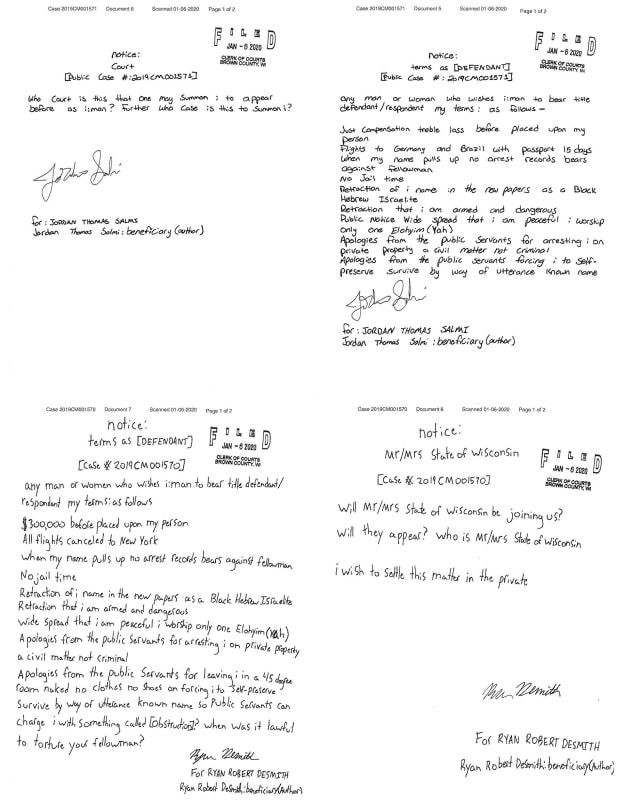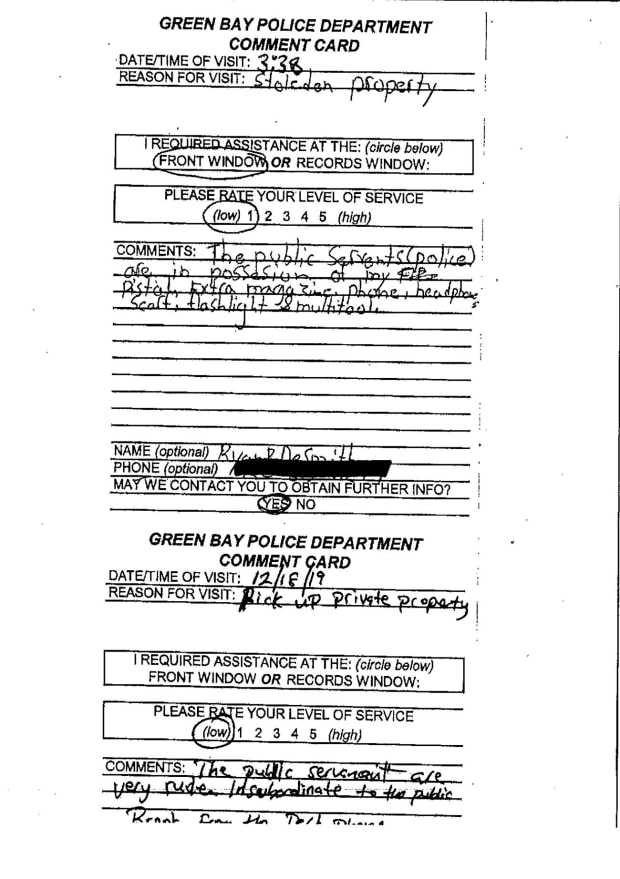Along with Kabeer Gbaja-Biamila, at least two other ex-NFL players have joined Straitway, the controversial ministry that many consider to be a cult. Plus, KGB’s bizarre courthouse interactions that ended with him being tasered in court.
Robert Mathis was looking for answers. The search had begun during the last part of his playing career, when he started reading full books of the Bible. But two years into retirement, it was consuming him.
During his playing days for the Colts, Mathis, a five-time Pro Bowl pass rusher, was a regular attendee of the team’s Saturday-night chapel service, and he frequently volunteered with community ministry initiatives organized by the team chaplain. But deep in his spirit, something about Christianity never sat right with him. As Mathis puts it, “Something was tugging at me. It just doesn’t line up.”
He had stayed with the organization after retirement, and the 2018 season was his second as an assistant coach working with pass rushers. He had more time on his hands, and he spent it digging for religious meaning and into his own personal history, long hours researching his lineage and assembling his family tree. He downloaded an app about Black history in the Bible.
That January, after the Colts’ season wrapped up, a former teammate reached out. Daniel Muir wanted to know whether Mathis would be interested in partnering with him in the training business; Mathis invited him to his house to talk about it.
Muir showed up wearing a black T-shirt with HEBREW in white letters across the front. Before they even talked about the coaching opportunity, Mathis asked Muir about the shirt’s meaning. Muir explained that he is a Hebrew—a real Hebrew man—and that Mathis is one, too. Muir took out his phone and pulled up a video a friend from his time with the Packers had recently sent him.

CHAPTER 1: The School Play, the Minister of Defense and the Fall of a Hero | CHAPTER 2: The Pastor, the ‘Cult’ and Its Troubled Past
By then, Kabeer Gbaja-Biamila had already been to Tennessee to visit the headquarters of the Straitway Truth Ministry, a controversial group that, due to some extreme religious beliefs, the controlling behavior of its leadership and its devotion to ideas often associated with sovereign citizenry, is considered by many to be a cult. Within months, KGB was sending videos of Straitway’s leader, Pastor Charles Dowell, to Muir. Those videos had Muir paging through his Bible, looking for scripture to prove Dowell wrong. After a week of close Bible reading, Muir found himself agreeing with Dowell’s interpretations.
Now, Muir was introducing Dowell and Straitway to Mathis. The two former Colts hardly talked about the training business that night. “I want one of those shirts,” Mathis told Muir.
Mathis is the latest ex-NFL player confirmed to have joined Straitway, though as with KGB, he and his family seem to have paid a price. And, after seeing KGB go through a series of bizarre interactions with the court system this year—culminating in deputies Tasering him during an appearance last March—many worry about just where this path leads.
* * *
Former Colts chaplain Ken Johnson sends a scripture text every morning to a group of around 100 former Colts players. Mathis and Muir are still part of that group, though it’s been a few months since either has responded to him. Until Sports Illustrated informed him, Johnson had no idea the two had become so immersed in a Hebrew Israelite group. “Are you kidding me?” he said. “No! No way. Wow. … Part of me wants to call [them] and be like, Dude, what are y’all doing?”
During his time as their chaplain, Johnson didn’t remember Mathis or Muir raising any theological questions or alternative interpretations of scripture that would raise a red flag—nothing like Packers team chaplain Jim Baraniak had with KGB. Johnson met one-on-one with Mathis a few times after his retirement, and Muir was devout and particularly active in sharing his Christian faith. Muir’s father was a nondenominational Christian minister, and he spent a lot of time at church growing up—he kept that faith close when he went to the NFL. Muir never missed a Bible study and could always be counted on for speaking engagements in the community, even as recently as last year, Johnson says.
But Johnson isn’t completely surprised. During nearly 30 seasons as the Colts’ chaplain, he saw this pattern among retired players. When the structure, guidance and purpose that comes with life as an NFL player disappears, it’s often jarring and sometimes followed by a search for identity. “It’s like they begin this quest for knowledge, and they forget relationship capacity [with their families],” Johnson says. The shift to Hebrew Israelism is new to him—in the past, the postretirement shift led some Black players to join the Nation of Islam, an Islamic and Black nationalist movement that has been criticized for anti-LGBTQ views and prejudice against Jewish people.
Dowell’s appeal to those ex-NFL players is obvious. “He is unapologetically masculine,” says James Hudnut-Beumler, an American religious history professor at Vanderbilt and former dean of the divinity school. “Men who are ex-military or ex-NFL have moved into a more feminized world, so to see themselves in another organization that gives them meaning as men can be quite attractive. If you look at the imaging on the YouTube videos, he’s almost a coach-like figure explaining things, presenting things, presenting the truth—that is different. That is what is new here.”
Dowell has more than 5,000 videos on YouTube, an endless stream of content for a retired player who suddenly finds himself with time on his hands. KGB discovered Dowell via YouTube while researching videos on head coverings for women. Dowell also has a Patreon account where viewers can pay to subscribe to his videos. For his part, Muir says he had come across a video of Dowell’s a year before KGB began sending them; he was already in the middle of his own frustrations with Christianity. For him, receiving that Pastor Dowell video from KGB was just further confirmation.
“You can easily send it to your ex-football friends,” says Hudnut-Beumler. “That’s how social sharing becomes indoctrination.”
Mathis, who went to a historically black college (Alabama A&M), had always been interested in Black history and was proud of his identity as a Black man. Unbeknownst to Muir, Mathis says he had been unofficially calling himself a Hebrew before they met. A self-described history buff, he researched the results of his DNA test, Benin-Togo ethnicity. He says his research led him to sources that claimed that region in West Africa, what is known today as the Ivory Coast, was once called the Kingdom of Whidah. Then he found images of old British maps that also listed Whidah as another name, Juda. Mathis traced that to his knowledge of the Kingdom of Judah and the biblical Israelites.
Soon after their initial meeting, Mathis started binge-watching Dowell’s videos. He asked Muir to introduce him to Dowell face-to face so he could determine for himself whether the pastor was for real.
Muir now heads up the Indianapolis chapter of Straitway. His wife, Kristin, and their three sons followed him. Kristin stopped wearing makeup, began wearing a head covering and sold her Louis Vuitton and Gucci purses and wallets on Facebook, part of Straitway’s teachings to live simply, save money and share everything with the ministry.
* * *
Vocab Malone, the pen name of a Christian author and critic, an expert on Hebrew Israelism who publishes educational videos on religions to YouTube, says that he’s been contacted by several NFL chaplains who are concerned that Hebrew Israelism is creeping into the league. He says the chaplains have asked him how to identify early warning signs and how to talk to a player who is expressing interest in it. One team chaplain said that after a game last season he was approached on the field by the opponent’s chaplain, who asked about the influence of Hebrew Israelism in the locker room.
Malone says a handful of NFL chaplains told him they have been cut off by former players who have embraced Hebrew Israelism and rejected Christianity, and they worry about the impact on players’ mental health and their families.
Muir is an exception in that his wife and sons joined Straitway with him. Mathis’s family situation more closely resembles KGB’s. A source in the Indianapolis community says that Mathis and his wife, Brandi, no longer live together, and that Mathis moved out sometime in 2019. The source says he is no longer involved in his children’s lives. When asked directly whether his wife and five children—two girls (one from a previous relationship of Brandi’s) and three boys—are following him to Straitway, Mathis said, “Yeah, the family is intact.” After a couple more follow-up questions about his wife and children, Mathis excused himself from the interview. There are no court records indicating the couple is legally divorced, but Brandi’s social media accounts are scrubbed of photos of Robert, or any mention of the last name Mathis. She posts photos of her kids celebrating Christmas and birthdays, holidays that Straitway adherents don’t recognize, and she is not wearing a head covering in her photos. In an October 2019 YouTube Q and A, Mathis was asked about the transition for Brandi and their children. He answered, “Tough, I’ll leave it at that.” Brandi Mathis declined to comment for this story.

Mathis’s involvement is no secret to the Colts. About four months ago, he says he decided to get out in front of rumors that he had joined a cult. He set up a meeting with head coach Frank Reich and general manager Chris Ballard to “make sure they understood who I am and who I am not, and also to make sure my privacy of beliefs were to be respected.” Mathis says he showed Reich and Ballard Straitway’s website, and that he and Reich had a good conversation about the Bible. “I am not hiding anything,” Mathis says. A Colts spokesperson responded to SI’s questions with a statement on behalf of the organization: “Individuals have the right to their religious beliefs and affiliations and those choices are personal in nature.”
When Mathis joined, that made at least three ex-NFL players in Straitway: KGB, Muir and Mathis. The players insist that Dowell has never asked them for money, though their fame and reach as former NFL players is an obvious benefit for Straitway. And their wealth helps the ministry in other ways. For instance, in March, Muir paid $450,000 for a house and 59 acres of land in Logansport, Indiana, 75 miles north of Indianapolis, to build an independent community. Muir would not say whether Mathis lives with him on the land, though Muir has posted several group photos of the Indianapolis community families to his personal Facebook page. Muir’s wife and sons are pictured, and so is Mathis, but Brandi and their children are not.
* * *
Praiseland sits at the bend of a long rural street in the village of Hobart, a town abutting Green Bay. An imposing wrought iron gate with a PRIVATE PROPERTY sign marks the entrance to a driveway so long that, from the bottom, the mansion is barely visible through the trees.
Toward the end of Kabeer Gbaja-Biamila’s nine-year NFL playing career, he and his wife, Eileen, began building a home for their growing family on 18 acres of land. They called the property Praiseland as a play on Elvis Presley’s Graceland. In the process of planning and constructing the home, Kabeer kept pushing to add more and more to it—an extra bathroom here, another kitchen there. He wanted this home to be part of their ministry so they could help anyone who needed space.
By the end of construction, Praiseland measured in at 30,000 square feet with an indoor pool and gym, and another house that was already on the property when they bought it. That house was divided into three separate apartment-style suites. The Gbaja-Biamilas put all that space to use. They hosted their sons’ basketball practices; the annual fundraising gala for their school, Providence Academy; weddings for family friends; and always volunteered their home for ministry needs, like hosting church groups or putting up visiting pastors.
In March 2018, 10 years after KGB’s retirement, Eileen, eight months pregnant with the couple’s eighth child, was moving out her and their children’s belongings. Several friends, mostly couples who had once been close with Kabeer and Eileen—then Packers and current Saints running back Ty Montgomery among them—were helping her. At one point, according to a Hobart/Lawrence Police Department incident report, Eileen called the police chief with a request for officers to help keep the peace as she packed her things. Kabeer was refusing to let any of Eileen’s female friends into the home—only men were allowed in.
According to the incident report, when the officers arrived, Kabeer was sitting in the kitchen eating cereal. The officers pulled him into a hallway to inform him they were there only to ensure things didn’t escalate. As they did, “an unidentified heavy-set male who Kabeer identified as a “pastor” came up behind Kabeer and held his phone up like he was recording the conversation. The pastor (a legalistic biblical teacher not affiliated with Straitway) started questioning the police.
As the day went on, Kabeer and the pastor proceeded to walk around the house reading scripture aloud. It was, as Kabeer put it to the officers, to “keep the witches at bay.” Kabeer filmed a live video on the Marco Polo app to Straitway’s Sons of Jacob group chat, used by Straitway members, as he walked around. He recorded Eileen’s church friends, calling them “heathens,” while they taped up boxes in the garage, and he filmed Eileen as she packed up the children’s shoes. He shouted out his viewers, “Hey Brother Freeman! Hey Joshua!” and as he filmed Eileen he told them that his only crime was that he wanted to go to Straitway to see how they do the Sabbath. Eileen cut in, “Tell everybody else that is one side of the story.”
Kabeer prodded her to give her side of the story. “Here’s the Sons of Jacob. Tell your side, Eileen! I’m taping, tell your side!”
Eileen declined, saying, “I am not going to stoop to what you do. I won’t do it.”
Along with frequently posting videos on YouTube, KGB runs a Patreon account with three tiers of access. According to his bio, he provides subscribers with “relationship advice, court info/common law, budget management for family/ not giving your strength to women.” (He became a certified financial planner in 2016.) On one recent live show, a New York man called in to talk about his experience going through a divorce because his wife wasn’t following the Commandments. He said that even though Kabeer was an NFL player, he could relate to his struggle with being a victim of the court system and dealing with a woman who would not submit.
“If it were up to me I’d stop doing YouTube,” Kabeer says, “but you have to see the finished product, have to see there’s life after divorce.”
The property that once hosted youth basketball practices, school fundraisers and church groups is still in use, but it’s a different ministry, preaching a different “truth.” Dowell encourages his followers to “homestead,” pool money and resources together and live as a tight-knit community isolated from any worldly influences. Kabeer has held several events at his home, like a debate about honoring the Sabbath and his 2019 wedding to Bri Rainey, where he had so many people visit that they spilled over in tents on his land and inside his gym. The property is now called Straitway Praiseland.
* * *
There were certain consistencies across KGB’s court appearances over the past year. In the Brown County Courthouse courthouse rotunda, he was usually flanked by a few of his Straitway “brothers.” Typically that meant Ryan Desmith and Jordan Salmi—the two 20-something white members who were arrested and charged with carrying a concealed weapon, disorderly conduct and obstructing police after showing up, armed, to a Christmas program being put on by the private school KGB’s kids attend. (In June, they pleaded no contest to a misdemeanor count of carrying a concealed weapon; the other two charges were dismissed.) David Cardenas, another Straitway member, was usually there too.
Some in the courthouse watched their behavior and believed they were setting up a perimeter. Cardenas, Desmith and Salmi would typically stand apart from KGB, leaning against different columns in the rotunda and watching his every interaction. Desmith and Salmi were sometimes considered to be dressed in paramilitary attire: black boots, beige shirts, a circular scarf (the kind that’s meant to keep the sands of Afghanistan or Iraq out of a soldier’s face—it serves no practical purpose in the suburbs of Wisconsin). KGB scoffs at the notion, “that’s just the way they dress.” Once inside the courtroom, at least one of the three typically takes out a phone and starts recording, even though that’s against the courthouse rules.
KGB believes he is being targeted by local law enforcement, and perhaps there’s truth to that—he is surely on their radar. But he and Straitway have gone out of their way to make their interactions with the legal system—particularly the courts—memorable.
First, there was the journey to get to Desmith’s and Salmi’s plea deals. During the process, the two flooded the court with nonsense filings, a tack common in cases involving sovereign citizens. Examples from their handwritten filings (sic throughout, presumably by design): “Who court is this that one may summon ; to appear before as i:man? Further who case is this to summon i?” or “Will Mr/Mrs State of Wisconsin be joining us? Will they appear? Who is Mr/Mrs State of Wisconsin.”
Two days after their arrests, Desmith and Salmi made a still-unexplained visit to the Green Bay County Clerk’s office to apply for passports. According to the incident report, their behavior was so strange that the County Clerk called the police to report them, and a clerk’s office employee told officers that the process was “the most bizarre behavior he had witnessed in his seven years with the department.” Among other things, Julio Garcia, the employee who helped the men with their applications, showed police the paperwork on which Desmith and Salmi listed P.O. boxes as their home addresses. They listed Gbaja-Biamila as their emergency contact. According to the report, they tried to “change their parents to show that their parents were not from the United States.” And one of the two already had a passport that didn’t expire until 2026. In a written statement to the court a few weeks later, Salmi requested passports and flights to Germany and Brazil.

As for KGB himself, things unraveled during an appearance for a divorce proceeding on March 17. As Cardenas looked on from the back of the courtroom, according to an incident report Kabeer began reading Bible verses aloud, sprinkling in some of his interpretations of Wisconsin’s state constitution while the judge, Donald Zuidmulder, was trying to hold court. He then went through a familiar spiel, that he doesn’t recognize the law and the court and is not party to this system. Zuidmulder had presided over several hearings in Kabeer and Eileen’s divorce case and had been patient with Kabeer throughout the process. On this day, he was giving Kabeer two choices: sign paperwork that would give Eileen access to bank accounts or go to jail for contempt.
It was no use; KGB had worked himself into a religious fury, and soon Zuidmulder had had enough. He ordered KGB to be arrested for contempt and, as Gbaja-Biamila continued to yell, left the bench for his chambers as the officers in the courtroom moved to make the arrest. According to the incident report, the officers explained to KGB, for several minutes, that he was going to be arrested. There was an officer on each arm as they tried to wrestle a pair of oversize handcuffs onto him. They pushed KGB’s arms behind his back, but he jerked his arms forward, dragging both officers along and throwing them off balance. He sat with his fingers interlaced in front of his body, and the officers were unable to force his hands apart.
“Eileen! Is this what you want?” Kabeer turned his head to shout at his ex-wife, who sat across the courtroom with her attorney. He shouted at the officers that he did not consent to his arrest. He might not have heard a deputy’s warning that he would use his Taser if KGB didn’t comply with the judge’s arrest order.
Suddenly, KGB’s back arched and his muscles tensed up. He fell forward with a thud; the jolt from the two prongs in his upper back had launched him out of his chair. He kicked out his legs at the officers after he landed on the floor.
The officers handcuffed KGB while he was still on the ground, then made sure he didn’t need medical attention. However, he refused to stand and walk, so they transferred him to a restraint chair because he was too heavy to carry to the elevator. He sobbed as they wheeled him out. (The contempt charge was later dropped.)
A few hours later, he started a live YouTube video titled “Tased, Arrested, and Hospitalized for Standing Up for My Rights!!” shot from the passenger seat of a car as he said he was on the way home from the hospital after getting his elbow and neck checked out.
“I just want to let you guys know I am pretty beat up but I am alive and well, thank Yah. … The persecution is real. There is nothing that I have gone through that Jesus didn’t go through. Jesus died, he died, because he was about the Father’s business. I am being afflicted and persecuted because I am about the Father’s business.”
Straitway’s strategy with the courts seemed to change when Desmith and Salmi agreed to plea deals in June. According to a Green Bay Post-Gazette report, they “displayed respect for the judge, and cooperated without any of their usual arguments.” But, as KGB explains it, it was motivated by practicality, not philosophy. “That strategy was, agree with your adversaries quickly,” he says. “It’s all a facade. You are going to get killed over nothing.”

* * *
According to various incident reports, Eileen has insisted to law enforcement that while she’s afraid of what Kabeer’s followers might do, she doesn’t believe Kabeer would harm her or their kids. However, not everyone is convinced. Eighteen states have passed some form of a red flag law, a gun control measure that allows police or family members to petition a state court to order the temporary removal of firearms from a person who may present a danger to others or themselves. Wisconsin is not one of those states, and to the chagrin of local law enforcement, neither of the restraining orders against Kabeer includes a firearms restriction. Though even if the law prohibits them from carrying weapons—as part of their plea deal in June, Desmith and Salmi are not allowed to possess firearms during their year of probation—consider that Desmith and Salmi entered a school play with weapons despite not having a concealed carry permit, and some suspect Straitway’s Green Bay ministry is already awash in guns.
The fear is that, at some point, KGB will try to take his kids back, and once inside Straitway Praiseland—a large property potentially guarded by an armed ministry—it could be a nightmare trying to get them back. And there was a time, early in his separation, when the idea of taking back the eight children he had with Eileen might have appealed to him, according to three separate incident reports. In September 2017, after they were separated but before the divorce was finalized, Kabeer showed up to the condo where Eileen and the kids were staying, put two of the kids in the back of his SUV and drove off. He returned within minutes. A few weeks after that, he returned to the condo again, refused to leave and refused to let go of their five-year-old son. The property owner called police, and by the time they arrived Kabeer said all he wanted to do was hug his kids; he did, then he left. Last October, Eileen called police after Kabeer left a comment on one of his son’s Instagram posts: “I’m coming for you all.” (After his son replied, “huh?” Kabeer added, “if you wish.”) As he did during the Christmas program incident, he often refers to his children as his “property.”
But Kabeer hasn’t seen the kids from his first marriage in two and a half years—he has never met the youngest. After his last supervised visit, he says he blew up at his children for being disrespectful; he couldn’t physically discipline them during the visits, so all he could do was yell. The lone supervisor, a woman, told him that he needed two supervisors going forward, and at least one of them needed to be a man because he had an issue with female authority. Kabeer says he decided it wasn’t worth it to pay for two supervisors.
Now, when told that law enforcement is worried about him taking his kids, KGB shakes his head and says, “They don’t have to waste their time. … I won’t pursue them. They need to come to me; they owe me honor and respect.”
Gbaja-Biamila’s father, Mustapha, has Parkinson’s disease and lives with him in Green Bay (but does not participate in Straitway). KGB says that, as a blue-collar plumber raising a family in Los Angeles during the ’80s and ’90s, his father was a strict disciplinarian and indisputably the head of the family. KGB cites his father’s physical discipline as the reason why he’s been successful, and specifically as the reason he stayed away from the Crips, who had a presence next door to his childhood home.
So KGB did the same for his own kids. When they needed to be disciplined he sometimes did it physically, with an instrument but never his hands. “I used [an instrument] for correction and I do not see that as abuse,” he says. “I think it is abusive when you don’t use the rod and you let your children grow up and not correct them. Like the Bible says: Spare the rod, spoil the child.”
He required his kids to call him Sir—they were never allowed to call him Dad. KGB says teammates and their families took notice of how obedient his children were, and he says that other Packers wives wanted their husbands to be more like him. Muir says KGB had a nickname in Green Bay, “the Kid Whisperer.”
“No one in the world could convince me I’m a bad father; I was a good father,” he says. “Everybody always complimented me on how well behaved my sons and daughter were. They were blown away.”
When asked whether he thinks he ever crossed a line with disciplining his kids, he asks, What is the line? “When you get a spanking you are going to get a bruise,” he says. “It is not a pretend thing, it is meant to hurt to discourage them from doing whatever they did that was bad. Now, what you should be asking, did you throw them out the window? Did they bust a head to the point that they had to go to a doctor? You can get bruised on the playground.”
Looking back, KGB thinks he was too soft on his kids. He doesn’t remember his dad ever playing with him, and he thinks he made a mistake by doing so with his children. “Even though I was more of a disciplinarian than the white culture, I still played with them,” he says. “I watched movies with them, I went to their games, I tried to do both, and I think towards the end, it made it easy for them to dishonor me. If I was in their situation, there is no way I would choose my mom over my dad. I have too much reverence for my dad, like the Bible says. The way I raised them, it was set up perfectly for them to disrespect me.”
He has a new family now. This spring, Bri gave birth to the couple’s first child, a son. Kabeer posted a video introducing his son to his Patreon account available to mid-tier Patrons and higher, but he wouldn’t confirm the child’s existence when asked by Sports Illustrated. He said if he were to have a newborn son, there would be no birth certificate. He says he wants to have 94 children (a nod to his jersey number) and knows he needs more than one woman to achieve that goal.
“I am like a farmer,” he says. “You plant seeds, the storm comes in, it takes [those seeds] out. Guess what? You replant. I am going to replant. I am going to rebuild my house and I got me a woman and we are going to keep on moving. … I have everything I need to create life again.
“I hope to have so many babies the ones I lost will be a forgotten story. Job lost all his babies too, and God blessed him with more.”
* * *
“I don’t know that we’re at the end of this,” says Jim Baraniak, the Packers’ team chaplain, who was often KGB’s theological foil during Kabeer’s playing days. “He will find disciples and he will find people to follow him. I think that’s why some people [get] enthralled by this.”
While his YouTube feed is heavy on living-room confessionals loaded with misogyny and anger, there is a different kind of video pinned to the top. Titled “What Is a Cult?” and filmed last December before the Christmas program incident, KGB does the rounds at a Lambeau Field tailgate and juxtaposes Straitway and Packers fandom, and why both, in their own way, are “cults.” Few will find his core argument—that there’s little difference between the two groups—convincing, but seeing him lightheartedly interacting and laughing with Packers fans is a reminder of why he was once so beloved in Green Bay.

“He always brought light into the locker room and not darkness, [but] when you see him now it seems like there is more darkness than there is light,” says former Packers head coach Mike Sherman, who says he spoke for this story in the hopes of getting through to KGB.
Ron Jung, the headmaster at Providence Academy, was once close to Kabeer. In a video recorded on the morning of the Christmas program incident, KGB calls Jung a “Slavemaster,” and the threatening comments left by subscribers were part of the reason Jung alerted the police that something might go down that night. Jung declined to comment to SI, except to say, “After all this, I still pray for my friend.”
Baraniak floated the idea of an intervention featuring former Packers teammates and staffers and people from the tight-knit Green Bay community. The half-dozen ex-teammates who spoke to SI reiterated how passionate KGB once was about his Christian faith, and how they remember him as a good man with a good heart. Ahman Green, a former Packers running back who remains in touch with KGB via email, thinks his old teammate feels abandoned after the wave of vitriol that followed the Christmas program incident. “That man is hurting inside,” Green says. “He is crying out for help. Right now, what he feels is, nobody—aside from me and a few guys who reached out to him—has his back.”
KGB says that anyone who cared about him would have reached out to him personally. A few, like Green, have, but as for the many who didn’t, he wants them to know, “I am alive, I am well, I am healthy. I am at peace right now.”
Some will point to head trauma as the reason for his behavior. KGB is adamant he isn’t suffering from CTE (which can be diagnosed only posthumously), and the steps of his religious transformation can be traced. CTE might play a role, but he has most likely arrived at this point due to a convergence of factors, not all of them within his control.
He realizes his hard-earned reputation in Green Bay has been “crushed.” He feels Straitway is misunderstood, and that’s why he’s looking to sell his property and move. Maybe to somewhere in the South, he says. “The racism here is very covert,” he says. “I appreciate the KKK more than [a racist] who smiles in my face.”
As for losing his family, getting Tasered and arrested, the restraining orders, he sees it all as persecution, “the evidence that you are in the truth …” he says. “It just makes me say, wow, the Word is really true, because Jesus is predicting [this].”
With persecution as the proof, he’s undeterred by the many naysayers. “Not one single person has been able to say Kabeer, here is your wrong,” he says. “They have told me I have done wrong, but they never can show me in the Bible.
The Word, written about the lives of people who existed 2000 years ago, taken in its most literal interpretation, determines the way he thinks, acts, eats and who he calls family.
“If I keep the Bible the way I do,” he says, “I should never run into trouble.”
It is what he believes.
• Question or comment? Email us.


















